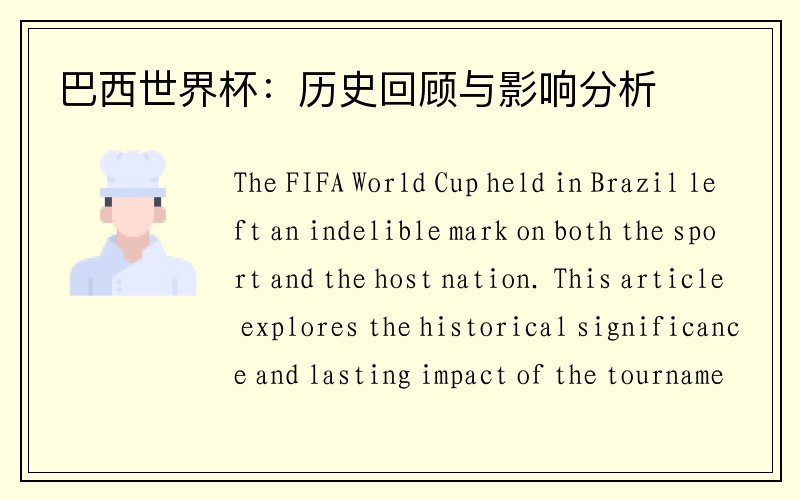巴西世界杯:历史回顾与影响分析
The FIFA World Cup held in Brazil left an indelible mark on both the sport and the host nation. This article explores the historical significance and lasting impact of the tournament, examining its cultural, economic, and sporting implications.
1、赛事历史与文化影响
The history of the Brazil World Cup dates back to its inception in 1930, but its cultural impact spans far beyond mere football. The tournament became a celebration of Brazilian culture, showcasing samba rhythms, vibrant colors, and the nation's passion for the beautiful game. This section delves into how the event amplified Brazil's global cultural influence and solidified football as a cornerstone of Brazilian identity.
The Brazil World Cup not only showcased football prowess but also integrated local culture into the global stage. The stadiums were not just venues but stages for Brazilian art, music, and hospitality. This fusion of sport and culture left a lasting impression on attendees and viewers worldwide, shaping perceptions of Brazil as a dynamic and culturally rich nation.
Furthermore, the tournament's impact extended to tourism and international relations, fostering a renewed interest in Brazil and strengthening its diplomatic ties globally.
2、经济效益与基础设施发展
The economic benefits of hosting the World Cup were substantial but accompanied by challenges. This section analyzes how Brazil's investment in infrastructure—such as stadiums, transportation, and urban development—impacted its economy and long-term growth. The influx of tourists and investments during the tournament boosted various sectors, yet questions lingered about the sustainability of these investments post-event.
Brazil's preparations for the World Cup spurred significant infrastructure projects, aimed at modernizing cities and improving public services. However, concerns over cost overruns and the legacy of underutilized stadiums persisted, prompting debates on the balance between short-term economic gains and long-term economic sustainability.
Despite criticisms, the World Cup accelerated infrastructure improvements, leaving a legacy of enhanced urban mobility and upgraded facilities that benefited Brazilian cities beyond the tournament's conclusion.
3、体育竞技与球队表现
The sporting aspect of the Brazil World Cup captivated audiences worldwide, showcasing thrilling matches and exceptional talent. This section examines key moments in the tournament, memorable performances by teams and players, and the impact on football tactics and strategy.
天博体育官方平台入口Brazil 2014 witnessed remarkable displays of skill and determination, from Germany's dominant performances to Costa Rica's surprising run. The tournament set new records and benchmarks, influencing the evolution of football tactics and player development globally.
Moreover, the competition highlighted the growing parity among football nations, with traditional powerhouses facing stiff competition from emerging teams across different continents.
4、社会遗产与后续影响
The Brazil World Cup's social legacy extends beyond sport, influencing societal attitudes and policies. This section explores its impact on issues like public health, education, and urban development, examining how the tournament's legacy continues to shape Brazil's social fabric.

The event spurred initiatives aimed at social inclusion, promoting sports among youth, and improving public services in underserved communities. It also catalyzed discussions on sustainable development and legacy planning for future mega-events.
Furthermore, the World Cup stimulated national pride and unity, fostering a sense of collective identity and solidarity among Brazilians amid socio-economic challenges.
总结:
巴西世界杯不仅是一场全球性的体育盛会,更是巴西文化、经济和社会发展的重要契机。赛事历史与文化影响使巴西成为全球焦点,经济效益与基础设施发展推动了城市现代化进程,体育竞技与球队表现激发了全球足球的新篇章,而社会遗产与后续影响则深刻影响了巴西的社会进程和国家认同感。
巴西世界杯不仅仅是一场体育盛会,它的影响力超越了赛场,深刻地改变了巴西及全球对体育、文化和发展的理解与认知。
